Slow Trade – Sound Farming. A Multilateral Framework for Sustainable Markets in Agriculture.
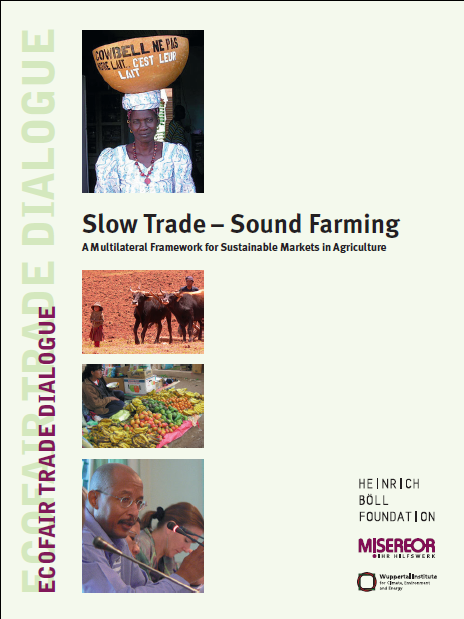 Together with ten internationally renowned experts, Wolfgang Sachs and Tilman Santarius outline an alternative to agricultural trade policies of the World Trade Organization. The report points to new perspectives and policies needed for the agricultural trading system that provide the poor with real opportunities, protect the environment and support the transition of agriculture into a post-fossil age. Here is the original version of the report Slow Trade – Sound Farming in English von Slow Trade – Sound Farming, which has also been published in German, French, Spanish, Arab, Czech, Polish, Portuguese, Indonesian, and Italian.
Together with ten internationally renowned experts, Wolfgang Sachs and Tilman Santarius outline an alternative to agricultural trade policies of the World Trade Organization. The report points to new perspectives and policies needed for the agricultural trading system that provide the poor with real opportunities, protect the environment and support the transition of agriculture into a post-fossil age. Here is the original version of the report Slow Trade – Sound Farming in English von Slow Trade – Sound Farming, which has also been published in German, French, Spanish, Arab, Czech, Polish, Portuguese, Indonesian, and Italian.
Rethinking food security strategies in times of climate change
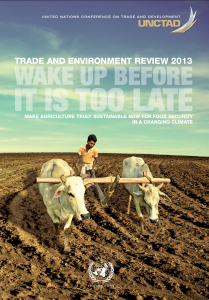 Since the 1980s, policies concerning food security have been increasingly trade-oriented. Yet for bulk of rural economies in developing countries, particularly for small farmers, this strategy did not deliver. This article by Christine Chemnitz and Tilman Santarius in the UNCTAD Trade and Environment Review outlines how the current pattern of agricultural trade and production can be modified in order to stop the vicious circle of increased trade-orientation exacerbating climate change, and increased climate change endangering small farmers’ food security. It then presents policies for a regionalization of agricultural trade flows and the integration of smallholders in local and regional markets.
Since the 1980s, policies concerning food security have been increasingly trade-oriented. Yet for bulk of rural economies in developing countries, particularly for small farmers, this strategy did not deliver. This article by Christine Chemnitz and Tilman Santarius in the UNCTAD Trade and Environment Review outlines how the current pattern of agricultural trade and production can be modified in order to stop the vicious circle of increased trade-orientation exacerbating climate change, and increased climate change endangering small farmers’ food security. It then presents policies for a regionalization of agricultural trade flows and the integration of smallholders in local and regional markets.
Towards a New Architecture of Agricultural Trade in the World Market.
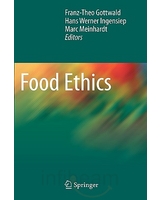 In the WTO, rules for global agricultural trade are designed according to many interests, but hardly not to the concerns of environmental protection and social justice for small farmers in the South and North. How would the outline of a world trading system look like that takes these concerns serious? Here, Wolfgang Sachs and Tilman Santarius outline five pillars for a World Fair Trade Organization. which have been published in the book “Food Ethics”, edited by Gottwald/Ingensiep/Meinhardt.
In the WTO, rules for global agricultural trade are designed according to many interests, but hardly not to the concerns of environmental protection and social justice for small farmers in the South and North. How would the outline of a world trading system look like that takes these concerns serious? Here, Wolfgang Sachs and Tilman Santarius outline five pillars for a World Fair Trade Organization. which have been published in the book “Food Ethics”, edited by Gottwald/Ingensiep/Meinhardt.
Climate and Trade – Why Climate Change Calls for Fundamental Reforms in World Trade Policy
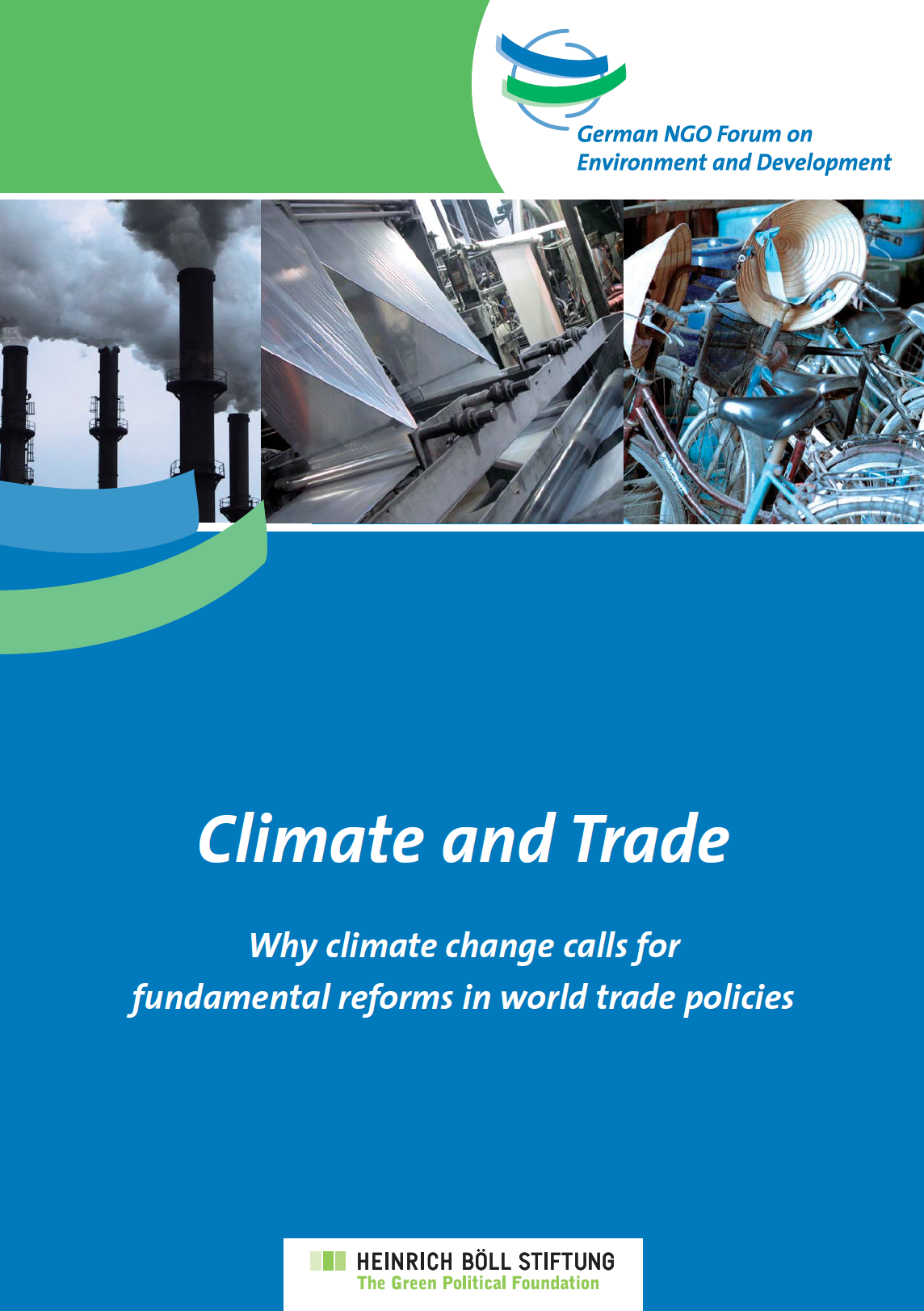 Foreign economic and trade policy are mostly designed along by the principles of free trade and export maximization. As a result, the world economy has become interconnected and more dense, and production chains span from one hemisphere to the other. Is this globalized world trade compatible with the aim to keep global warming below the dangerous threshold of 2 or even 1.5 degrees Celsius? Here is the study “Climate and Trade“, which highlights reform options for trade as well as for climate policy. In particular, it raises the issues of displacement of emissions (leakage), border adjustment measures, and technology transfer.
Foreign economic and trade policy are mostly designed along by the principles of free trade and export maximization. As a result, the world economy has become interconnected and more dense, and production chains span from one hemisphere to the other. Is this globalized world trade compatible with the aim to keep global warming below the dangerous threshold of 2 or even 1.5 degrees Celsius? Here is the study “Climate and Trade“, which highlights reform options for trade as well as for climate policy. In particular, it raises the issues of displacement of emissions (leakage), border adjustment measures, and technology transfer.
The Misery of the WTO. For a Reinvention of World Trade.
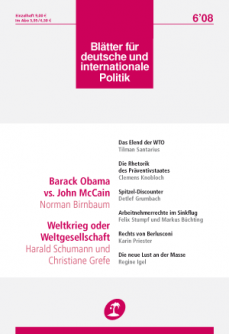 The multilateral trading system is in its deepest crisis in decades. After many years of haltingly negotiations, it seems to have become almost irrelevant whether the end of the Doha Round of the WTO will one day be officially announced, or negotiations remain extended without results. The crisis of the WTO has two causes: a lack of trust and an ideological prejudice. A lack of trust exists because the countries of the North judge trade with two standards, free trade for the South and protectionism for their own economies. In this article, Tilman Santarius points out five shortcomings of world trade policy, giving rise to five milestones for the reinvention of a multilateral trading system.
The multilateral trading system is in its deepest crisis in decades. After many years of haltingly negotiations, it seems to have become almost irrelevant whether the end of the Doha Round of the WTO will one day be officially announced, or negotiations remain extended without results. The crisis of the WTO has two causes: a lack of trust and an ideological prejudice. A lack of trust exists because the countries of the North judge trade with two standards, free trade for the South and protectionism for their own economies. In this article, Tilman Santarius points out five shortcomings of world trade policy, giving rise to five milestones for the reinvention of a multilateral trading system.
The World Bank’s WDR 2008: Response from a Slow Trade – Sound Farming Perspective.
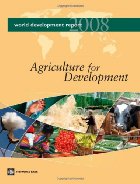 For more than two decades, the issue of agriculture had practically disappeared from the global political agenda. The World Development Report 2008 of the World Bank for the first time recovers the central importance of the issue for the development in the global South. But the World Bank report primarily focuses on productivity gains, rather than recognizing the potential of sustainable small-scale production methods for development, poverty reduction and environmental protection. See here EcoFair Trade Paper No.10, in which Sophia Murphy and Tilman Santarius discuss the World Development Report of the World Bank and make a critical assessment of alternative reform proposals.
For more than two decades, the issue of agriculture had practically disappeared from the global political agenda. The World Development Report 2008 of the World Bank for the first time recovers the central importance of the issue for the development in the global South. But the World Bank report primarily focuses on productivity gains, rather than recognizing the potential of sustainable small-scale production methods for development, poverty reduction and environmental protection. See here EcoFair Trade Paper No.10, in which Sophia Murphy and Tilman Santarius discuss the World Development Report of the World Bank and make a critical assessment of alternative reform proposals.
World Trade and the Regeneration of Agriculture
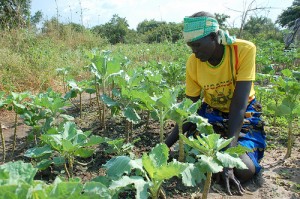 Industrial agriculture, often producing in global value chains, can be understood as the intersection of two of today’s most severe crises: climate crisis and loss of biodiversity. What are the impacts from agriculture on local and global ecosystems, and also on small farmers’ livelihoods? What are the different strategies to de-industrialization of agriculture in the North and South? Which are the countries which act as major exporters of industrial agriculture, and with what products? And what reforms would be required in the World Trade Organization and other trade policy bodies in order no longer encourage any further specialization and intensification of production? See here for the EcoFair Trade Dialogue Discussion Paper No. 9 by Wolfgang Sachs and Tilman Santarius.
Industrial agriculture, often producing in global value chains, can be understood as the intersection of two of today’s most severe crises: climate crisis and loss of biodiversity. What are the impacts from agriculture on local and global ecosystems, and also on small farmers’ livelihoods? What are the different strategies to de-industrialization of agriculture in the North and South? Which are the countries which act as major exporters of industrial agriculture, and with what products? And what reforms would be required in the World Trade Organization and other trade policy bodies in order no longer encourage any further specialization and intensification of production? See here for the EcoFair Trade Dialogue Discussion Paper No. 9 by Wolfgang Sachs and Tilman Santarius.
Balancing Trade and Environment
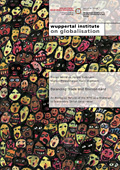 If at all, environmental protection and sustainability play a subordinate role in the policies of the World Trade Organization (WTO). The growing incompatibility of a liberalized world trade with the protection of the biosphere is one of the biggest challenges for global governance in the 21st Century. One part of the study by Tilman Santarius and colleagues addresses the areas of conflict between environmental and trade law, and examines potential solutions. Another part discusses the instrument of Strategic Impact Assessment with regard to its suitability to incorporate environmental issues systematically in policy-making processes of the WTO. Download the study “Balancing Trade and Environment” here.
If at all, environmental protection and sustainability play a subordinate role in the policies of the World Trade Organization (WTO). The growing incompatibility of a liberalized world trade with the protection of the biosphere is one of the biggest challenges for global governance in the 21st Century. One part of the study by Tilman Santarius and colleagues addresses the areas of conflict between environmental and trade law, and examines potential solutions. Another part discusses the instrument of Strategic Impact Assessment with regard to its suitability to incorporate environmental issues systematically in policy-making processes of the WTO. Download the study “Balancing Trade and Environment” here.